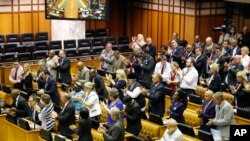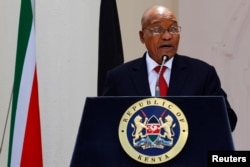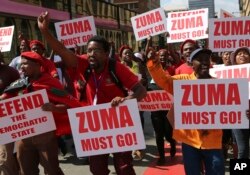South Africa’s president, Jacob Zuma, has survived yet another vote of no confidence in parliament.
The main opposition party, the Democratic Alliance (DA), presented the motion, arguing that indications Zuma allowed the powerful Gupta family to choose Cabinet members shows he is a threat to the country’s stability.
Last week, South Africa’s state watchdog agency recommended that a judicial commission investigate the relationship that Zuma and some state officials had with the Guptas, a business family of Indian immigrants accused of meddling in the government for financial benefit, according to the Associated Press.
But when it came time to vote, the ANC used its majority to keep Zuma afloat.
“The voting summary is as follows; the Yes is 126, No is 214, abstain is one, not voted is 58,” said Deputy Speaker Lecheba Tsenoli, announcing the outcome. “The motion is therefore not agreed to.”
Robust debate
The debate Thursday was frank. From the start, opposition parties raised numerous points of order calling for the vote to be decided through a secret ballot, to protect members of the ruling African National Congress party who might want to vote Zuma out. Some ANC members have urged Zuma to resign.
“A vote against this motion is a vote for state capture, it is a vote for corruption, it is a vote for theft, it is a vote for power abuse,” said Mmusi Maimane, the DA leader.
Other opposition parties also kept the pressure on. Chief whip of the Economic Freedom Fighters (EFF) party, Floyd Shivambu, called on the ANC to dispose of Zuma.
“We believe that the liberation movement itself should have found it in its conscience to act against Jacob Zuma,” Shivambu said, adding that Zuma has “abdicated his responsibility as a leader of our country and gave it to a family.”
ANC parries
The ANC pushed back against the motion, calling it a waste of time.
Nomvula Mokonyane, an ANC member of parliament, referred to the motion as the opposition party’s desperate attempt to find relevance.
“Continuously the DA and its allies present before this house motions and issues that seek to undermine our commitment to realize radical economic transformation and the creation of a social order that will benefit the majority of our people,” Mokonyane said.
With eight attempts at a no-confidence vote and a string of scandals having failed to force Zuma out of office, opposition parties say they plan to leave the matter to voters in the next national polls, which do not happen until 2019.






